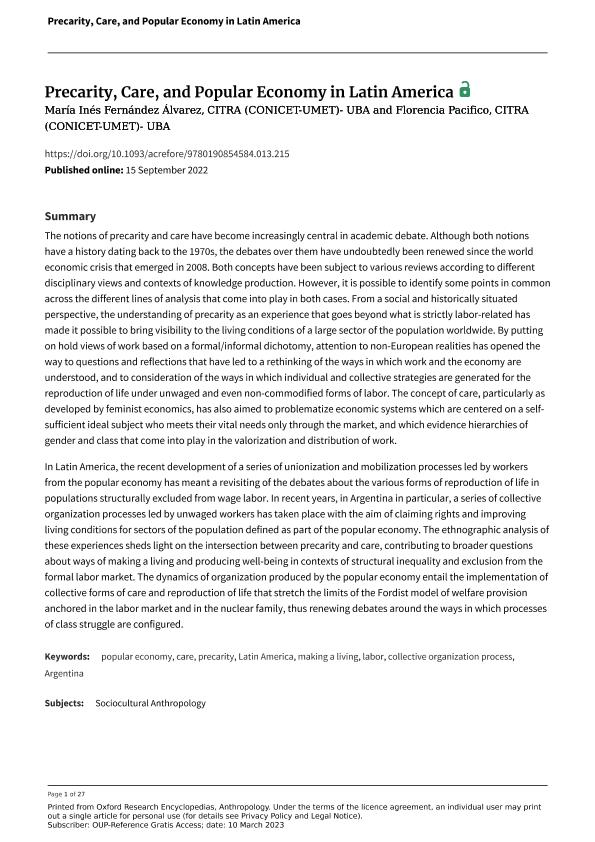Mostrar el registro sencillo del ítem
dc.contributor.author
Fernandez Alvarez, Maria Ines

dc.contributor.author
Pacífico, Florencia Daniela

dc.date.available
2023-10-06T14:13:57Z
dc.date.issued
2022-09
dc.identifier.citation
Fernandez Alvarez, Maria Ines; Pacífico, Florencia Daniela; Precarity, Care, and Popular Economy in Latin America; Oxford University Press; Oxford Research Encyclopedia of Anthropology.; 2023; 9-2022; 1-27
dc.identifier.issn
9781-9085
dc.identifier.uri
http://hdl.handle.net/11336/214326
dc.description.abstract
The notions of precarity and care have become increasingly central in academic debate. Although both notions have a history dating back to the 1970s, the debates over them have undoubtedly been renewed since the world economic crisis that emerged in 2008. Both concepts have been subject to various reviews according to different disciplinary views and contexts of knowledge production. However, it is possible to identify some points in common across the different lines of analysis that come into play in both cases. From a social and historically situated perspective, the understanding of precarity as an experience that goes beyond what is strictly labor-related has made it possible to bring visibility to the living conditions of a large sector of the population worldwide. By putting on hold views of work based on a formal/informal dichotomy, attention to non-European realities has opened the way to questions and reflections that have led to a rethinking of the ways in which work and the economy are understood, and to consideration of the ways in which individual and collective strategies are generated for the reproduction of life under unwaged and even non-commodified forms of labor. The concept of care, particularly as developed by feminist economics, has also aimed to problematize economic systems which are centered on a self-sufficient ideal subject who meets their vital needs only through the market, and which evidence hierarchies of gender and class that come into play in the valorization and distribution of work.In Latin America, the recent development of a series of unionization and mobilization processes led by workers from the popular economy has meant a revisiting of the debates about the various forms of reproduction of life in populations structurally excluded from wage labor. In recent years, in Argentina in particular, a series of collective organization processes led by unwaged workers has taken place with the aim of claiming rights and improving living conditions for sectors of the population defined as part of the popular economy. The ethnographic analysis of these experiences sheds light on the intersection between precarity and care, contributing to broader questions about ways of making a living and producing well-being in contexts of structural inequality and exclusion from the formal labor market. The dynamics of organization produced by the popular economy entail the implementation of collective forms of care and reproduction of life that stretch the limits of the Fordist model of welfare provision anchored in the labor market and in the nuclear family, thus renewing debates around the ways in which processes of class struggle are configured.
dc.format
application/pdf
dc.language.iso
eng
dc.publisher
Oxford University Press

dc.rights
info:eu-repo/semantics/openAccess
dc.rights.uri
https://creativecommons.org/licenses/by-nc-sa/2.5/ar/
dc.subject
POPULAR ECONOMY
dc.subject
CARE
dc.subject
PRECARITY
dc.subject
MAKING A LIVING
dc.subject.classification
Otras Humanidades

dc.subject.classification
Otras Humanidades

dc.subject.classification
HUMANIDADES

dc.title
Precarity, Care, and Popular Economy in Latin America
dc.type
info:eu-repo/semantics/article
dc.type
info:ar-repo/semantics/artículo
dc.type
info:eu-repo/semantics/publishedVersion
dc.date.updated
2023-07-07T18:14:06Z
dc.journal.volume
2023
dc.journal.pagination
1-27
dc.journal.pais
Reino Unido

dc.journal.ciudad
Oxford
dc.description.fil
Fil: Fernandez Alvarez, Maria Ines. Consejo Nacional de Investigaciones Científicas y Técnicas. Oficina de Coordinación Administrativa Saavedra 15. Centro de Innovación de los Trabajadores. Universidad Metropolitana para la Educación y el Trabajo. Centro de Innovación de los Trabajadores; Argentina
dc.description.fil
Fil: Pacífico, Florencia Daniela. Consejo Nacional de Investigaciones Científicas y Técnicas. Oficina de Coordinación Administrativa Saavedra 15. Centro de Innovación de los Trabajadores. Universidad Metropolitana para la Educación y el Trabajo. Centro de Innovación de los Trabajadores; Argentina
dc.journal.title
Oxford Research Encyclopedia of Anthropology.
dc.relation.alternativeid
info:eu-repo/semantics/altIdentifier/url/https://oxfordre.com/anthropology/display/10.1093/acrefore/9780190854584.001.0001/acrefore-9780190854584-e-215
dc.relation.alternativeid
info:eu-repo/semantics/altIdentifier/doi/http://dx.doi.org/10.1093/acrefore/9780190854584.013.215
Archivos asociados
